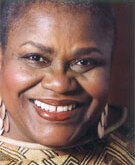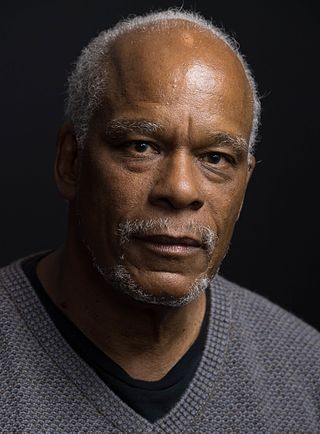
Bernice Johnson Reagon is a song leader,composer,scholar,and social activist,who in the early 1960s was a founding member of the Student Non-violent Coordinating Committee's (SNCC) Freedom Singers in the Albany Movement in Georgia. In 1973,she founded the all-black female a cappella ensemble Sweet Honey in the Rock,based in Washington,D.C. Reagon,along with other members of the SNCC Freedom Singers,realized the power of collective singing to unify the disparate groups who began to work together in the 1964 Freedom Summer protests in the South.
"After a song",Reagon recalled,"the differences between us were not so great. Somehow,making a song required an expression of that which was common to us all.... This music was like an instrument,like holding a tool in your hand."

The Civil War is a 1990 American television documentary miniseries created by Ken Burns about the American Civil War. It was the first broadcast to air on PBS for five consecutive nights,from September 23 to 27,1990.
American Experience is a television program airing on the Public Broadcasting Service (PBS) in the United States. The program airs documentaries,many of which have won awards,about important or interesting events and people in American history.
Henry Eugene Hampton Jr. was an African-American filmmaker. His production company,Blackside,Inc.,produced over 80 programs—the most recognizable being the documentary Eyes on the Prize, which won Emmy Awards,Peabody Awards,and was nominated for an Oscar.

Juan Antonio Williams is an American journalist and political analyst for Fox News Channel. He writes for several newspapers,including The Washington Post,The New York Times,and The Wall Street Journal,and has been published in magazines such as The Atlantic and Time. Williams has worked as an editorial writer,an op-ed columnist,a White House correspondent,and a national correspondent. He is a registered Democrat.

ITVS is a service in the United States which funds and presents documentaries on public television through distribution by PBS and American Public Television,new media projects on the Internet,and the weekly series Independent Lens on PBS. Aside from Independent Lens,ITVS funded and produced films for more than 40 television hours per year on the PBS series POV,Frontline,American Masters and American Experience. Some ITVS programs are produced along with organizations like Latino Public Broadcasting and KQED.

Paul J. Stekler is a political documentary filmmaker,a professor,and former chair and head of the production program in the Department of Radio-Television-Film at the University of Texas at Austin College of Communication. Known for his documentary films about American politics,he was also the on-camera advisor to the cast of The Real World Austin during their attempt to create a documentary about the South by Southwest Music Festival (2005–2006). Among other major filmmaking awards,he has earned two Peabody,three Columbia/duPont,three national Emmy awards,and a Special Jury Award at the Sundance Film Festival.

Ric Burns is an American documentary filmmaker and writer. He has written,directed and produced historical documentaries since the 1990s,beginning with his collaboration on the celebrated PBS series The Civil War (1990),which he produced with his older brother Ken Burns and wrote with Geoffrey Ward.

Stanley Earl Nelson Jr. is an American documentary filmmaker and a MacArthur Fellow known as a director,writer and producer of documentaries examining African-American history and experiences. He is a recipient of the 2013 National Humanities Medal from President Obama. He has won three Primetime Emmy Awards.
Jon H. Else is an American documentary filmmaker and professor at the UC Berkeley Graduate School of Journalism. He directs the documentary program.
Eyes on the Screen was a project to disseminate the American television documentary series Eyes on the Prize by file sharing networks without regard to copyright restrictions during the period the series was out of print,1993-2006.
The Murder of Emmett Till is a 2003 documentary film produced by Firelight Media that aired on the PBS program American Experience. The film chronicles the story of Emmett Till,a 14-year-old black boy from Chicago visiting relatives in Mississippi in 1955. He was brutally murdered by two white men after a white woman falsely claimed that he had whistled at and groped her.

Judy Richardson is an American documentary filmmaker and civil rights activist. She was Distinguished Visiting Lecturer of Africana Studies at Brown University.
The African Americans:Many Rivers to Cross is a six-part documentary miniseries written and presented by Henry Louis Gates Jr. It aired for the first time on the Public Broadcasting Service (PBS) in the fall of 2013,beginning with episode 1,"The Black Atlantic (1500–1800)",on October 22,8–9 p.m. ET on PBS,and every consecutive Tuesday through to episode 6,"A More Perfect Union (1968–2013)",on November 26. The companion book to the series,The African Americans:Many Rivers to Cross,was co-authored by Gates and historian Donald Yacovone. The two-DVD set of the series was released in January 2014.
Vietnam:A Television History (1983) is a 13-part documentary mini-series about the Vietnam War (1955–1975) from the perspective of the United States. It was produced for public television by WGBH-TV in Boston,Central Independent Television of the UK and Antenne-2 of France. It was originally broadcast on PBS between October 4 and December 20,1983.
The history of the 1954 to 1968 American civil rights movement has been depicted and documented in film,song,theater,television,and the visual arts. These presentations add to and maintain cultural awareness and understanding of the goals,tactics,and accomplishments of the people who organized and participated in this nonviolent movement.
Connie Field is an American film director known for her work in documentaries.
Frederick Leonard is an American activist who was involved in the civil rights movement.

William O'Neal was an American FBI informant in Chicago,Illinois,where he infiltrated the local Black Panther Party (BPP). He is known for being the catalyst for the 1969 police/FBI assassination of Fred Hampton,head of the Illinois BPP.

Samuel D. Pollard is an American film director,editor,producer,and screenwriter. His films have garnered numerous awards such as Peabodys,Emmys,and an Academy Award nomination. In 2020,the International Documentary Association gave him a career achievement award. Spike Lee,whose films Pollard has edited and produced,described him as being "a master filmmaker." Henry Louis Gates Jr. characterizes his work in this way:"When I think about his documentaries,they add up to a corpus —a way of telling African-American history in its various dimensions."










